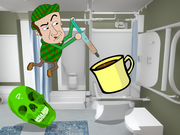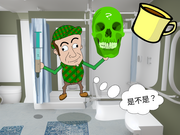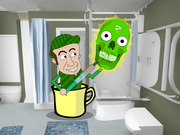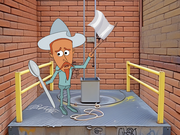still / still in progress / still more / yet / even more / in addition / fairly / passably (good) / as early as / even / also / else
to be (followed by substantives only) / correct; right; true / (respectful acknowledgement of a command) very well / (adverb for emphatic assertion)
是
=
旦
+
龰
:
Mnemonic symbol: a skull, from "to be or not to be".
Sherlock Holmes (sh) starts his day in the space station's bathroom (Ø4) with a mug of coffee (旦). Holding a skull (mnemonic symbol for 是) in his hands, he asks himself "to be, or not to be" (是). He wonders if he can make the skull come back to life using lots of coffee, and injects coffee from his mug into the skull using a syringe (龰).
Sherlock Holmes (sh) starts his day in the space station's bathroom (Ø4) with a mug of coffee (旦). Holding a skull (mnemonic symbol for 是) in his hands, he asks himself "to be, or not to be" (是). He wonders if he can make the skull come back to life using lots of coffee, and injects coffee from his mug into the skull using a syringe (龰).
是
=
日
+
下
+
人
:
Mnemonic symbol: a skull, from "to be or not to be".
Sherlock Holmes (sh) watches the Neanderthal Man (人) trying to climb to the sun (日) on a ladder (下) in the space station's bathroom (Ø4). Sherlock is afraid that he'll open the window, so he puts on a big skull (是) and scares him off.
Sherlock Holmes (sh) watches the Neanderthal Man (人) trying to climb to the sun (日) on a ladder (下) in the space station's bathroom (Ø4). Sherlock is afraid that he'll open the window, so he puts on a big skull (是) and scares him off.
to hold / to contain / to grasp / to take hold of / handle / particle marking the following noun as a direct object / classifier for objects with handle / classifier for small objects: handful
to hold; to grasp / to hold a baby in position to help it urinate or defecate / handlebar / classifier: handful, bundle, bunch / classifier for things with handles / (used to put the object before the verb: 把[ba3] + {noun} + {verb})
he or him / (used for either sex when the sex is unknown or unimportant) / (used before sb's name for emphasis) / (used as a meaningless mock object) / other / another
he; him (used for either sex when the sex is unknown or unimportant) / (used before sb's name for emphasis) / (used as a meaningless mock object) / (literary) other
soft / flexible
软
=
欠
+
车
:
Rachel Rhinoceros (ru) left the anthill after drinking too much. When she got into her cabriolet (车), She felt that it was very soft (软), so soft in fact that she was not able to drive safely anymore: she drove her car directly into the anthill. Inside (an3) She then left an IOU note (欠) about the anthill's furniture for the owner of the anthill.
variant of 軟|软[ruan3]
软
=
欠
+
车
:
Rachel Rhinoceros (ru) left the anthill after drinking too much. When she got into her cabriolet (车), She felt that it was very soft (软), so soft in fact that she was not able to drive safely anymore: she drove her car directly into the anthill. Inside (an3) She then left an IOU note (欠) about the anthill's furniture for the owner of the anthill.
to prohibit / to forbid
of; ~'s (possessive particle) / (used after an attribute) / (used to form a nominal expression) / (used at the end of a declarative sentence for emphasis) / also pr. [di4] or [di5] in poetry and songs
good / well / proper / good to / easy to / very / so / (suffix indicating completion or readiness) / (of two people) close / on intimate terms / (after a personal pronoun) hello
good / appropriate; proper / all right! / (before a verb) easy to / (before a verb) good to / (before an adjective for exclamatory effect) so / (verb complement indicating completion) / (of two people) close; on intimate terms / (after a personal pronoun) hello
interjection of surprise / Ah! / Oh!
啊
=
口
+
阿
:
Auntie was supposed to meet Albert Einstein in front of the ashram, but Albert is nowhere to be seen. There is just a huge mandarin lying around. After auntie has waited for a long time, she finally decides to peel the mandarin. As she peels of the first piece, Albert Einstein jumps out of the mandarin, shouting "阿姨! Surprise!" Auntie in turn just screams "啊" in surprise as she swiftly suffers from a heart attack.
interjection or grunt of agreement / uhm / Ah, OK / expression of recognition / Oh, it's you!




